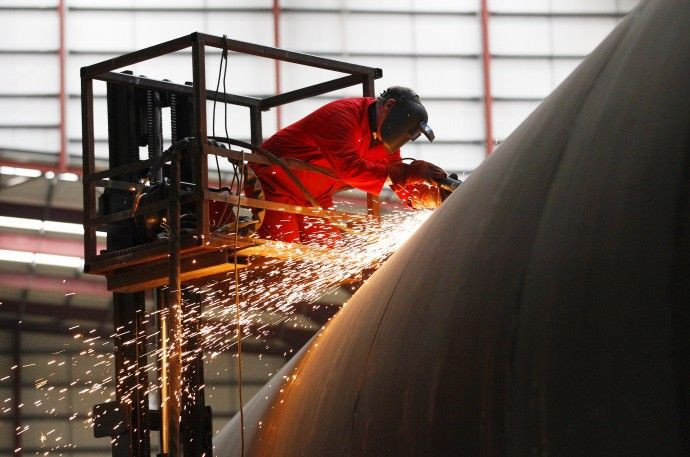UK manufacturing PMI hits record high in January

Manufacturing activity grew in January at its fastest pace since records began in 1992, and factory costs also surged, in a further sign that price pressures are building in the economy, a survey showed.
Employment in the manufacturing sector also rose at the quickest pace since the records began.
Sterling rose to its highest in 11 weeks against the dollar while UK March gilt futures extended losses after the data boosted expectations of rate increases.
The Markit/CIPS manufacturing Purchasing Managers' Index (PMI) climbed to 62.0 in January from an upwardly revised 58.7 in December. That was the highest reading since the survey began in 1992 and well above the consensus forecast of 57.9.
The survey, released on Tuesday, showed that new orders and employment also rose at their fastest rate on record and factory gate prices climbed at their strongest clip since August 2008.
The figures suggest the manufacturing sector continues to enjoy strong growth even as broader economic activity remains subdued.
Economists said the data raised the prospect of a rate rise as early as this month, despite a contraction in GDP in the final three months of 2010.
We've got a marked acceleration in growth in the industrial sector and it does suggest that there is some significant underlying strength in the economy, although the services number is the one that really matters, said Ross Walker of RBS.
It brings forward the risk of a rate rise sooner rather than later and brings February into play as a possibility
The only reason people think February is not a possibility is because of the GDP numbers... they (the MPC) might want to see more evidence of there being a rebound.
Housing market weakness may also make the Bank reluctant to raise rates. British mortgage approvals for house purchase fell more than expected in December to their lowest since March 2009, official data showed on Tuesday, suggesting house prices may have further to fall.
The Bank of England left its key interest rate at a record low 0.5 percent in January, but two of the nine-member Monetary Policy Committee voted for a quarter-point increase because of concerns about inflation, which is running at almost double the Bank's 2 percent target.
BRIGHT SPOT
The manufacturing PMI has remained above the 50 mark separating expansion and contraction for a year and a half.
Manufacturing, which accounts for around 13 percent of the British economy, was one bright spot in shock GDP figures published last week that showed the economy shrank by 0.5 percent in the last three months of 2010.
The GDP contraction had already been reflected in a Markit/CIPS services PMI in December, which showed services output fell for the first time since April 2009.
The manufacturing sector is doing much better and Markit said bad weather was not a prominent factor affecting activity in either December or January.
The sector needs to keep expanding and create private sector jobs to offset planned cuts in the public sector as the coalition government seeks to slash a record budget deficit.
Companies in January reported improved demand from both domestic and overseas markets, with the rate of increase in export orders among the fastest since the survey was launched in 1992. Growth reflected higher sales to the United States, emerging markets, Scandinavia and Australia.
However, inflationary pressures also continued to build, with substantial increases seen for both input costs and factory gate prices.
(Additional reporting by Jodie Ginsberg; Editing by Catherine Evans)
© Copyright Thomson Reuters 2024. All rights reserved.




















